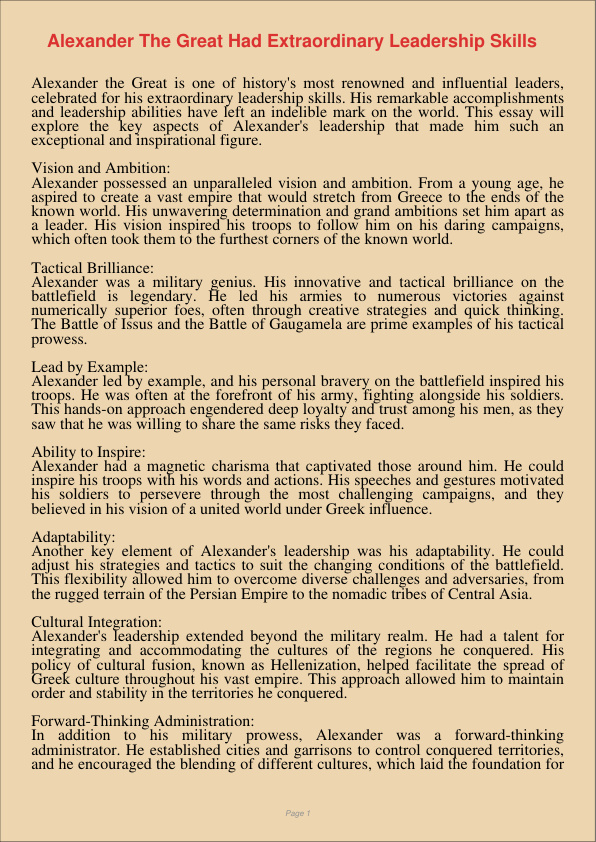Alexander The Great Had Extraordinary Leadership Skills
Jan 9, 2024
extraordinary leadership skills
great
Health Sciences & Medicine
Human Resources

Alexander the Great is one of history’s most renowned and influential leaders, celebrated for his extraordinary leadership skills. His remarkable accomplishments and leadership abilities have left an indelible mark on the world. This essay will explore the key aspects of Alexander’s leadership that made him such an exceptional and inspirational figure.
Vision and Ambition: Alexander possessed an unparalleled vision and ambition. From a young age, he aspired to create a vast empire that would stretch from Greece to the ends of the known world. His unwavering determination and grand ambitions set him apart as a leader. His vision inspired his troops to follow him on his daring campaigns, which often took them to the furthest corners of the known world.
Tactical Brilliance: Alexander was a military genius. His innovative and tactical brilliance on the battlefield is legendary. He led his armies to numerous victories against numerically superior foes, often through creative strategies and quick thinking. The Battle of Issus and the Battle of Gaugamela are prime examples of his tactical prowess.
Lead by Example: Alexander led by example, and his personal bravery on the battlefield inspired his troops. He was often at the forefront of his army, fighting alongside his soldiers. This hands-on approach engendered deep loyalty and trust among his men, as they saw that he was willing to share the same risks they faced.
Ability to Inspire: Alexander had a magnetic charisma that captivated those around him. He could inspire his troops with his words and actions. His speeches and gestures motivated his soldiers to persevere through the most challenging campaigns, and they believed in his vision of a united world under Greek influence.
Adaptability: Another key element of Alexander’s leadership was his adaptability. He could adjust his strategies and tactics to suit the changing conditions of the battlefield. This flexibility allowed him to overcome diverse challenges and adversaries, from the rugged terrain of the Persian Empire to the nomadic tribes of Central Asia.
Cultural Integration: Alexander’s leadership extended beyond the military realm. He had a talent for integrating and accommodating the cultures of the regions he conquered. His policy of cultural fusion, known as Hellenization, helped facilitate the spread of Greek culture throughout his vast empire. This approach allowed him to maintain order and stability in the territories he conquered.
Forward-Thinking Administration: In addition to his military prowess, Alexander was a forward-thinking administrator. He established cities and garrisons to control conquered territories, and he encouraged the blending of different cultures, which laid the foundation for the Hellenistic period that followed his reign.
Legacy and Inspiration: Alexander’s leadership skills left a lasting legacy. His conquests and the Hellenistic era that followed influenced art, science, and philosophy. His leadership continues to inspire leaders and military strategists to this day.
In conclusion, Alexander the Great’s extraordinary leadership skills were marked by his vision, ambition, tactical brilliance, ability to lead by example, power to inspire, adaptability, cultural integration, and forward-thinking administration. His legacy as a great leader endures, and he serves as a timeless source of inspiration for those interested in leadership and the art of achieving grand goals. Alexander’s unique combination of talents and attributes makes him one of the most exceptional leaders in history.